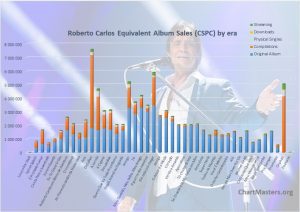Forum
To describe the popularity of Roberto Carlos in Brazil, let's just say that in a customer-for-customer ranking, he would be the GOAT of the music industry, miles ahead the likes Beatles, Elvis Presley, Cliff Richard, Johnny Hallyday, Julio Iglesias or Luis Miguel.
Breaking sales records with new recordings during 50 years, his unreal domination in his homeland was backed with the biggest ever overseas impact by a Portuguese language artist. Today, we review the discography of the one who shares the nickname O Rei ("The King") in Brazil with football legend Pelé.
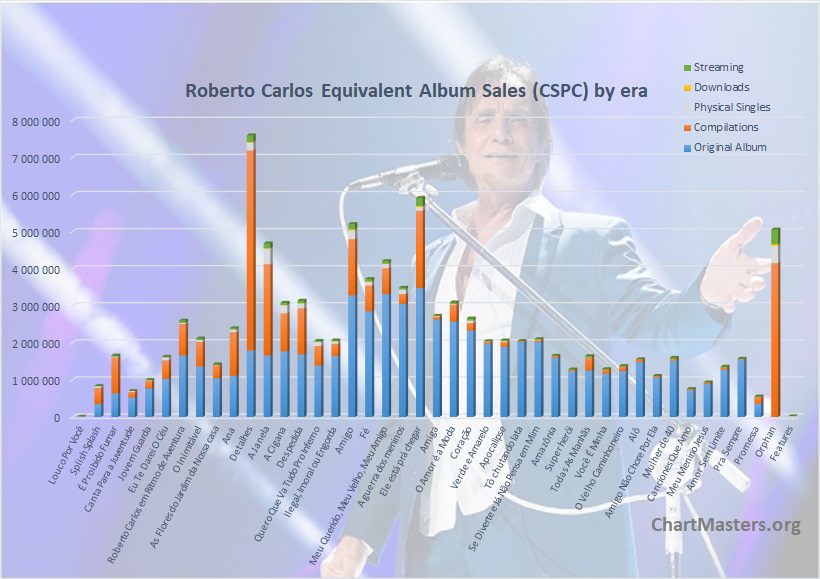
A few words about Roberto Carlos
Born April 19, 1941 in the Brazilian state of Espírito Santo, Roberto Carlos wasn't destined to superstardom. The last of 4 sons in a middle-class family, he lost the lower part of his right leg when he was 6 after being hit by a locomotive. But this tragic event didn't slow down his enthusiasm. At 9, he was already singing on local radio shows, while learning to play multiple instruments.
Starting as the iê-iê-iê flagship
A fan of Elvis Presley, he released his first LP in 1961, Louco por você. History tells it was a commercial disaster. In all fairness, it went Top 10. But the tiny market of the time and the fact the singer removed this record from the market very quickly mean its sales are irrelevant compared to his later works.
From 1962 and the LP Splish Splash, Roberto Carlos was already smashing. He started to release one album per year, with each one outdoing its immediate predecessor.
After the Beatles' impact on national airwaves, most notably with She Loves You, the iê-iê-iê musical genre was born, with Carlos being its flagship.
Along with fellow artist Erasmo Carlos, who would quickly become his writing partner, Roberto Carlos created the Jovem Guarda band. It wasn't a proper group, but instead a tag name for everyone willing to embark into the iê-iê-iê movement.
By 1965, the hype was already big enough to bring the concept on TV. Aired every Sunday on TV Record, the show was presented by the Carlos pair completed by Wanderléa. They welcomed various artists and groups and effectively kicked their careers, while promoting their own material too.
While the genre wasn't critically acclaimed the same way Bossa Nova was, the program's popularity went through the roof. Soon, every young Brazilian was dressing and chatting the way Jovem Guarda presentors were.
Setting up the perfect sales receipe
Roberto Carlos' 5th album was titled Jovem Guarda too. It sold over 150,000 units in its first year. From that point, the singer had already no challenger anymore in Brazil.
The next album was his first self-titled (more on that below). It outsold its precessor in 2 months, and soon became the first album ever to reach the 200,000 units milestone in the country.
Follow up 1967 soundtrack Roberto Carlos em Ritmo de Aventura had moved over half a million by the end of the decade, the first album to do so.
One album a year
The artist got into a never-ending roll, matching or topping his own records year after year. 1968's O Inimitável was another sales beast, so was his 2nd self-titled album from 1969.
This was only the start. From then on, every year at the start of December, a new Roberto Carlos album was going to come out. This continued all the way up to 1996, when he changed the title of his new release to Canciones Que Amo to highlight the Spanish-language of recordings.
In-between, Carlos, the son of a watchmaker, tweaked all the details of the unstoppable machinery that he was gearing up.
While he started as a pioneer of Brazilian rock, from the end of the 60s he leaned towards a more romantic sound. One could expect his fame to vanish along with the Jovem Guarda movement, instead, he got even bigger.
His albums refined their own traditions, from 1970 they started to include one religious song, then one environmental song, etc. All songs were apolitical, as the singer always claimed to be, too.
Singles were also held off until the release of the album. Yet, all of them got monster hits like Dethales, Amada Amante, A Montanha, and many more.
Promotion through Christmas TV shows
From 1974, one more element would send his albums to new heights if that was even possible. On December 24, 1974, the main national channel TV Globo aired a special show of the singer which got crazy ratings. It became another tradition. For more than 20 years, TV Globo's prime time program on Christmas Eve was a Roberto Carlos special.
Every year, the singer would typically fly to the US from September to November to record his new album, drop the LP at the start of December, prepare meticulously his TV special until its airing during that month, and then embark into a tour and promotion duties in the first semester of the following year.
It goes on to show that success isn't only about talent, but also professionalism and dedication. And on that matter, nobody does it better than Roberto Carlos.
After 18 months in the market, the 1975 effort topped the million mark. Here again, it was an all-time first on this market.
By 1980, his new releases were cracking the 2 million threshold. No need to say that nobody else was getting even close to these numbers.
Success abroads as well as in a changing home market
During this period, his success in Portugal, Spain and Latin America kept increasing, with an impressive range of hits. Inside the CBS roster, he was seen as one half of the "big 2", the other being Julio Iglesias.
He also dented the Italian market after his win at San Remo 1968. His attempt at an English LP came in 1981. However, it failed to convert as well as his Portuguese and Spanish albums.
From 1986, after more than 20 years of undisputed domination, another TV Globo phenomenon managed to top his sales both in Brazil and in Latin America: Xuxa was here.
Soon, Sertanejo music, the Brazilian version of Country, claimed most of the top-selling artists. Roberto Carlos had been for long a leader among MPB (acronym of Popular Brazilian Music). He maintained his status of incredible selling force, while being awarded his first Grammy for the best Latin album in 1989.
A never-ending success for Roberto Carlos?
His annual routine came to an end when his wife Maria Rita was diagnosed with cancer in 1998. She passed away a year later and naturally, the singer went off the radar in these moments. In the meantime, his label made up for his absence. They released a "studio" album filled with older live performances in 1998, as well as a couple of compilations getting released in 1999.
His following albums would be dedicated to his late wife. 2000's Amor Sem Limite and 2003's Pra Sempre both comfortably topped a million sales. Albums with no studio sets saw new live records (2001's MTV Acoustic) or compilations (2002's eponymous set) complete his discography.
Incredibly, after all these years, Roberto Carlos and Xuxa continued their never-ending success story. They were charted at 1 and 2, respectively, among 2001's best selling albums, 3 & 1 in 2002, 1 & 2 among artist albums in 2003, etc.
The former even managed to record the biggest album of 2012, with a release exclusively on a dead format, thanks to the EP Esse Cara Sou Eu. Not everyone can claim a real organic super hit at 71.
For most of the last 20 years though, the majority of his new releases have been live sets, with his last release being the 2018 Spanish record Amor Sin Limite.
Now 82, Roberto Carlos continues to tour both in Brazil and abroads.
A career so unique raises a lot of curiosity towards his total sales. How many units has he moved in a market representing only 2% to 3% of the global market? And how many million selling albums does he have?
The Commensurate Sales to Popularity Concept (CSPC)
As usual, I'll be using the Commensurate Sales to Popularity Concept in order to relevantly gauge his results. This concept will not only bring you sales information for all Carlos's albums, physical and download singles, as well as audio and video streaming. In fact, it will also determine their true popularity.
If you are not yet familiar with the CSPC method, below is a nice and short video of explanations. I highly recommend watching it before getting into the sales figures.
[adthrive-in-post-video-player video-id="qixxDCRj" upload-date="2023-11-08T15:43:50.000Z" name="Commensurate Sales to Popularity Analysis (CPSC) - Explanations.mp4" description="null" player-type="default" override-embed="default"]
Also, this Scribe video will give you the full idea within just a pair of minutes. But if you are a mathematical person, and want to know the full method as well as formulas, here is the full introduction article. It will get you to a deeper understanding of this revolutionary concept.
Now let's get into the artist's detailed sales figures and apply this concept to define the act's true popularity!
Roberto Carlos album sales
60s & 70s albums

80s & 90s & 00s albums

Updated Studio Album Sales & Comments
[wpdatatable id=30 var1=7fAKtXSdNInWAIf0jVUz65]
In the introduction, we mentioned how Jovem Guarda topped 150,000 units, em Ritmo de Aventura 500,000, and Ilegal, Imoral ou Engorda a million, the first ever LP to sell in 7 digits there.
While this is true and well documented, these records, especially the classic ones from 1964 to 1972, kept selling at a very strong pace for decades.
His 1994 CD remasters, for example, shipped 500,000 units in their first 3 months. And the campaign "Um Milhão de Amigos", which reissued his catalog in 2000, shipped 1 million copies upon release.
Shipment codes, printed on CD boxes since June 2003 in Brazil, reveal that em Ritmo de Aventura alone sold 185,000 units from that moment to the disappearance of the format in the late 10s.
Ultimately, no less than 8 out of the 9 albums which directly preceeded Ilegal, Imoral ou Engorda are also million sellers in Brazil, with em Ritmo de Aventura being the oldest, and also the biggest now on 1.5 million units.
Add to that sales overseas, and every album starting with 1966's Roberto Carlos ("Eu Te Darei O Céu") is over 1 million. Other classic albums, like 1971's Dethales and 1973's A Cigana, are close to 1.8 million thanks to impressive sales all over Latin America.
The 1977 effort sub-titled Amigo, eponymous to its main track, raised the bar to higher levels. This album is now way over 2 million in Brazil, but it also moved a million units elsewhere.
The exception was soon to be the norm, as the next 6 albums combine for nearly 18 million sales. 1981's album, home to monster hit Cama e Mesa, nears 3.5 million.
From 1984 to 1988, sales were very stable at 2 million, while the absence of Spanish versions and slightly decreasing Brazilian sales lowered 1990-1995 albums to an average of 1.25 million, which is still superb.
The track Mulher de 40 was a sizable hit, increasing the profile of his parent album, while the Spanish-only album Canciones Que Amo broke the string of 31 consecutive million sellers.
Both Amor Sem Limite and Pra Sempre added their sales among these diamonds albums, while 2012's Esse Cara Sou Eu is listed under remaining releases as it is a 4-tracks EP, with only 3 original recordings.
Adding it all up, Roberto Carlos sold over 65 million units with his studio albums... This is more than his idols Elvis Presley and Paul McCartney.
Roberto Carlos songs sales
Below, we list down the artist's results through physical sales, digital sales and streaming.
Please be aware that when the artist is regarded as the lead act, he is rewarded with 100% of these units, while featured acts share among them a 50% piece of the totals.

Physical singles
[wpdatatable id=27 var1=7fAKtXSdNInWAIf0jVUz65]
As a reminder, we use a 10 to 3 ratio between one album and one physical single.
Days of significant singles sales in Brazil are very long gone. But the discography of Roberto Carlos kicks way back in the start of the 60s.
When Fim De Amor / Malena sold over 30,000 units in 1962, it was enough to see media hype the singer as the next big thing. Even the most optimistic ones couldn't imagine what was coming next.
From 1962 to 1966, we see no relevant seller yet. This is because just like France, Brazil used EPs as their main singles format at the time.
The market switched to 2-tracks from 1967. The first single to benefit from that was Eu Daria A Minha Vida, which sold near 140,000 units globally.
In 1968, the Sam Remo winning track Canzone Per Te, which got pushed in several European markets, topped 400,000 sales, while Eu Te Amo, Te Amo, Te Amo, a big hit in his homeland, cleared 100,000.
The following year, a Spanish version of 1962 track Me Quiero Casar Contigo smashed in Mexico, also topping 100,000 sales. The impact of his new single songs grew up more and more at that time.
Amada Amante passed the 400,000 units level in 1971, then Por Amor did over 400,000 and Dethales did over 200,000 units in 1972. The latter was also the main B-Side of Un Gatto Nel Blu which sold 600,000 singles.
The following year A Distancia and A Montanha, either by themselves or combined, added for 900,000 sales of singles, while El Dia Que Me Quieras did over 300,000. By 1974/75, Proposta and Eu Quero Apenas were combining for over half a million sales.
Roberto Carlos was on a roll, piling super hits after super hits. He got dozens and dozens of top 10 hits all over Latin America, including various chart toppers.
Amigo (1977, 700,000), Lady Laura (1978, 300,000), Meu Querido, Meu Velho, Meu Amigo (1979, 200,000), A Guerra Dos Meninos (1980, 300,000), Cama E Mesa (1981, 275,000) confirmed that the singer was still capable of scoring smash hits in Latin America despite translating to a more adult sound through the years.
During the 80s, most markets from this region gave up the physical single format. The last breath came from 200,000 units seller Caminhoneiro in 1984.
The total stands at over 9 million, which may not seem so big for international standards, but belong to the very highest tallies for Latin singles.

Digital songs
[wpdatatable id=28 var1=7fAKtXSdNInWAIf0jVUz65]
As a reminder, we use a 10 to 1.5 ratio between one album and one digital single.
If Latin America has never been a good market for physical singles, it was even worse with downloads. They never really got into them, let alone for legacy tracks.
Consequently, the biggest digital market for Roberto Carlos happens to be the US. There, his popularity took off a bit later than elsewhere. His best period was spanning the late 70s to the early 90s.
At about 150,000 each, Amigo and Cama E Mesa lead the way. Un Gatto Nel Blu lands at 3, also in 6 digits. The rest of the top 10 is filled in by the usual suspects from Lady Laura to Detalhes and Caminhoneiro.
Amazingly, tracks from this top 10 span a period of 45 years, and it doesn't even cover his golden 60s era. The 2012 track Esse Cara Sou Eu managed to become one of his classics, while Jennifer Lopez paired Chegaste from 2016 does well too.
Despite low numbers individually, the size of Roberto Carlos' catalog brings digital sales to 1.5 million in total.

Streaming
Streaming consists of audio and video streams. Our CSPC methodology includes both to better reflect the real popularity of each track.
The main source of data for each avenue is respectively Spotify and YouTube. However, these platforms aren't always the go-to site for music streaming in Asia. In order to factor in the growing impact of multiple Asian countries, we have added more sources.
To account for their real popularity in each relevant country, we use the below sources and ratios, reflecting the market share of each area.
Audio streams
– South Korea: Genie streams * 2.20 (consistent with Gaon streaming numbers)
– Japan: AWA streams * 100 / 4 (AWA has 4% of the Japanese streaming market)
– Arabic world: Anghami streams
– Sub-Saharan Africa: Boomplay + Audiomack streams
– Elsewhere: Spotify streams * Spotify market shares based on artists' market distribution
Video streams
– China* : QQ video streams * 50 if the song is available for audio stream, QQ video streams * 5 elseway (scale built based on known figures for several major artists)
– Elsewhere : Youtube views increased by 10% to account for various local platforms
*since Chinese streaming platforms are mostly video streaming platforms, their streams are weighted on par with YouTube streams.
Audio Stream value – 1,500 plays equal 1 album unit
Video Stream value – 6,750 views equal 1 album unit
Equivalent Albums Sales (EAS) = ( Spotify * ArtistRatio + Genie * 2.20 + AWA * 100 / 4 + Anghami + Boomplay + Audiomack ) / 1500 + ( QQ views* 50(or 5) + YouTube * 1.1 ) / 6750
Top hits
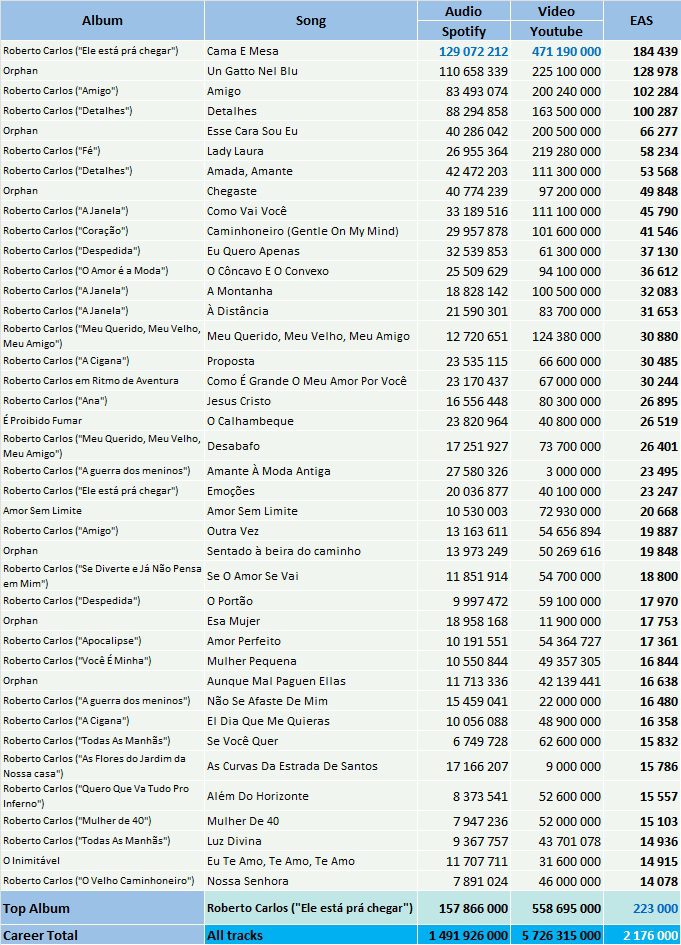
In a ranking stacked with huge legacy hits in the Latin world, Cama E Mesa reigns supreme with nearly 130 million streams on Spotify and over 470 million on YouTube.
The top 10 contains mostly the same tracks as the top digital sellers, with Un Gatto Nel Blu, Amigo and Detalhes hitting the 100,000 EAS milestone, while a dozen in total crack 100 million YouTube views.
Again, the density and the longevity proven by these results are incredible. The top 40 includes tracks from each the 60s, the 70s, the 80s, the 90s, the 00s and the 10s.
Usually, artists have one really big era, which lasts a handful of years. It's rare when artists can get organic hits from more than 6-10 albums. In this case, the situation is unique. The 34 non-Orphan tracks listed among Roberto Carlos' top 40 come from 25 distinct albums. And the next 2 would have made it 27.
YouTube views are especially impressive with well over 5 billion views. Also Spotify numbers at 1.5 billion impress for a legacy Portuguese-language singer.
Full catalog breakdown
If you are familiar with the artist's catalog and want to check details of each and every song, you can access all of them right here.
Keep yourself up to date
Our website provides you a fantastic tool which fetches updated Spotify streams as you request them, use it to watch these results grow day after day!
Roberto Carlos compilations sales
It sounds fairly logical to add together weighted sales of one era - studio album, physical singles, downloads, streams - to get the full picture of an album's popularity. For older releases though, they also generate sales of various live, music videos and compilation albums.
However, all those packaging-only records do not create value. They exploit the value originating from the parent studio album of each of its tracks instead. Inevitably, such compilations downgrade catalog sales of the original LP.
Thus, to perfectly gauge the worth of these releases, we need to re-assign sales proportionally to its contribution of all the compilations which feature its songs. The following table explains this method.
The distribution process
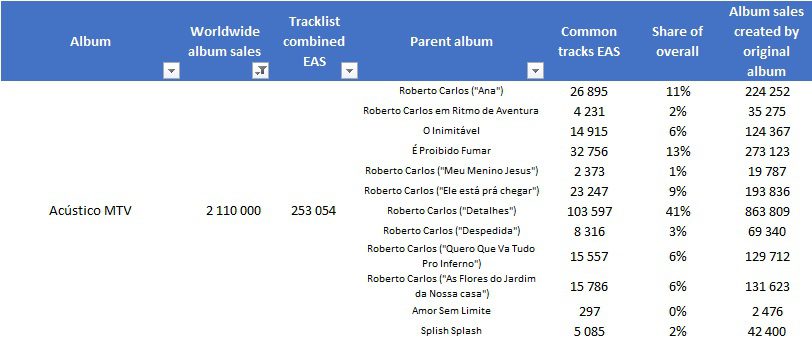
How to understand this table? In the example of Acústico MTV, these figures mean it sold 2,110,000 units worldwide. The second statistics column means all versions of all the songs included on this package add for 253,054 equivalent album sales from streams of all types.
The second part on the right of the table shows how many equivalent streams are coming from each original album, plus the share it represents on the overall package.
Thus, streaming figures tell us songs from the Detalhes album are responsible for 41% of Acústico MTV track list attractiveness. This means it generated 864,000 of its 2,110,000 album sales and so forth for the other records. We then apply this process to all compilations present on the table.
Compilations sales figures listing
[wpdatatable id=29 var1=7fAKtXSdNInWAIf0jVUz65]
Full length related records sales – Summary
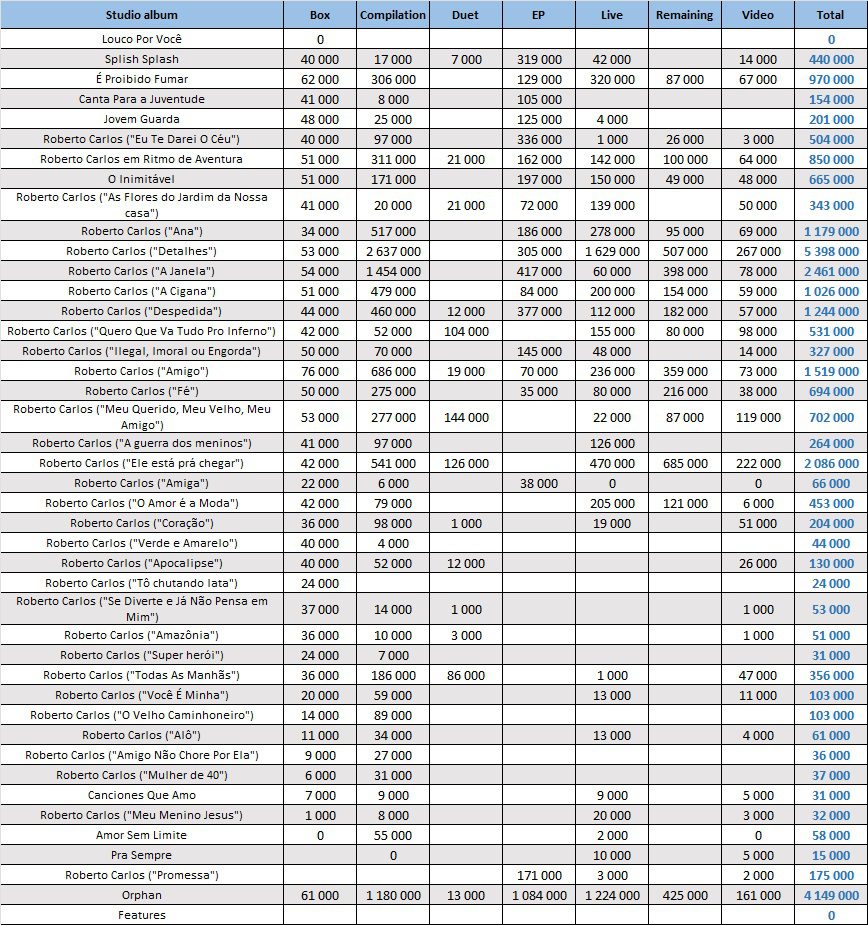
Here is the most underestimated indicator of an album’s success: the amount of compilation sales of all kinds it generated. Due to the dependency of sales of the original studio albums on these releases, they are a key piece of the jigsaw.
We obtain these numbers by applying the method from the section The distribution process to all packages listed under Compilation sales figures listing category.
I mentioned previously that in markets like Brazil, consumers went by EPs before the explosion of singles. In the 60s/70s, all his big hits sold 100,000 to 300,000 units in this format, just like his studio albums split over 2 or 3 EPs. In total, no less than 7 million EPs have been sold in the 60s/70s by the singer.
From 1972, countless of compilations started to be released. Among highlights, Argentinian album Los Más Grandes Éxitos De Roberto Carlos Vol. 2 - En Castellano topped half a million units, making it one of the best selling albums ever in the country.
As most of them were specific to each market, none broke sales records, with none coming close to a million. Yet, they do add for more than 12 million sales.
This doesn't consider the 6 million live sets, with nearly a million from San Remo 1968, 1.5 million from 1988's Ao Vivo, and 2.1 million from 2001's Acústico MTV. These releases also contribute greatly to the near 2 million music videos sold by Roberto Carlos.
A series of CD box sets sold over 1.7 million units in mid-00s, too. This was before he activated the revival of EPs. 2012's Esse Cara Sou Eu sold a terrific 2.15 million, 2013's Remixed did over 900,000 while 2017's eponymous EP registered 150,000 sales.
Hits from all over his catalog powered all these sales. But the prime provider has been Detalhes, which claims 5.6 million sales of side projects overall. Next up are A Janela and Ele está prá chegar at well over 2 million.
Total Album (all types) Sales per Country
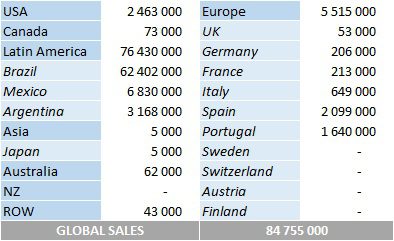
Please note country-specific numbers may miss sales of a few minor releases, although totals are complete.
Roberto Carlos career CSPC results

So, after checking all the figures, how many overall equivalent album sales has each album by Roberto Carlos achieved? Well, at this point we hardly need to add up all of the figures defined in this article!
Albums CSPC results
[xyz-ips snippet="updatedCSPCalbums"]
Well, what can we say? These results are beyond amazing.
The 1971 effort supported by Detalhes ends up with a relatively good lead at 7.8 million, Ele está prá chegar is the follow up at 6.2 million. At 5.3 million, Amigo completes a wonderful top 3.
If selling a million in Brazil is often a one in a lifetime feat, Roberto Carlos score 10 times sales in excess of 3 million, plus 11 more topping 2 million. This includes 19 consecutive multi million sellers with sets issued between 1970 and 1988.
As for million sellers, he pushes the tally to 35 (which would be 36 if Esse Cara Sou Eu were a studio album). It's simple, nobody, in the world, does better, as he ties with Frank Sinatra. Elvis Presley (31) and Barbra Streisand (30) follow them. His consecutive string of 31 is hands down the longest ever.
It's worth pointing out again that these releases came out every single year, without a single break for nearly 40 years.
These achievements convert into a career total of 98 million sales for Roberto Carlos. In Brazil, he sold over a third of Elvis Presley's US sales, in a market 10 to 15 times smaller depending on the period. He also outdid Johnny Hallyday's tally in France, which has a healthier market than Brazil.
In an approach similar to boxing pound-for-pound rankings, O Rei is arguably the biggest consumer-for-consumer artist of all-time, on top of being the all-time best selling act in Brazil and in Latin America as a whole.
Singles CSPC results
The list compiles album equivalent sales generated by each song. Therefore, these figures are not merged units of singles formats. Instead, they include weighted sales of the song's physical single, download, ringtone and streaming as well as its share among sales of all albums on which it is featured.
[wpdatatable id=48 var1=7fAKtXSdNInWAIf0jVUz65]
Discography results
[xyz-ips snippet="ArtistASRstats"]
Records & Achievements
- At 98,145,000 EAS, Roberto Carlos is the best selling Brazilian artist of all-time.
- At 89 million EAS, Roberto Carlos is the best selling artist of all-time in Latin America.
- At 35, Roberto Carlos has the most EAS million selling studio albums among any artist.
- Roberto Carlos has scored million selling records with original recordings in 6 consecutive decades.
- Roberto Carlos claimed the best selling album of the year in Brazil in more than 20 occasions.
- At 7,598,000 EAS, Detalhes is most likely the most successful 100% Brazilian album of all-time.
NB: EAS means Equivalent Album Sales.
Dynamic Spotify Key Performance Indicators
Please note that numbers below are retrieved automatically. Thus, they will evolve day by day, unlike previously listed data which is valid as of the publication date of the article.
[xyz-ips snippet="ArtistRandomDetails"]
As usual, feel free to comment and / or ask a question!
Sources: IFPI, Spotify, YouTube, Discogs.
We have more for you...
... Roberto Carlos' streaming masters analysis
... the upcoming artists list and how to vote for them!
... best-selling artists, albums, and singles
We have created amazing cross-artists tops. Click to see all CSPC and raw sales results compiled so far!
... similar artists
65 Million album sales in a market like Brasil??? I can’t think in any other artist with a dominance like this in a important and big market.
The fact that almost all his albums sold more than 1M there despite such a big production is mind blowing.
His sales in Brasil are 62.4M, got confused by the studio sales😵💫, but doesn’t change anything.
And from what I understand the Brazilian market decreased dramatically starting in 1998 because of CD piracy, with an 80% drop in 10 years I believe. This is a different phenomenon than digital piracy in the west, although I guess this played a role as well.
Anyway, I wonder how much more he would've sold without this crisis, he may have been in the top 50 acts of all-time?
Actually, thinking about it digital piracy was probably irrelevant here since the share of internet users in Brazil was still very low in the 2000s, also CD piracy may have been predominantly a youth phenomenon so maybe Carlos wasn't impacted that much?
Absolutely insane numbers. 70m in Brazil is crazy, I didn’t even know that was possible.
I must be honest I'm not aware of this artist very impressive figures though.When will you be doing Cliff Richard that would be interesting to see although would be very time consuming for you guys
What a great job! Thank you for making this article so accurate and complete. I already expected this result. For years I've heard that each Roberto Carlos album sold 1 million copies in Brazil (when talking about the 70s, 80s and 90s). His 2013 remix EP, for example, sold an impressive 900,000 copies in Brazil, in physical format, something that some US artists achieve with worldwide sales.
So is it correct to say that his 1981 album is the best selling record by a Brazilian artist while Xuxa's Xou da Xuxa 3 is the best selling album within Brazil?
I would say digital piracy was a youth phenomenon, cd piracy wasn't. Pirate cds were sold on streets by street vendors so probably they middle-age/older people bought them as much as or even more than younger people.
Oh interesting, thanks. I figured he may have been disadvantaged by being in a developing country like Brazil.
This makes his success even crazier, I mean he still had million-selling albums in the early 2000s, including one in 2003 at 1.6m! It's hard to tell what his total would be without this but he might actually have been in the top 50 acts of all-time.
What's happens with his total ? 99.914.000 EAS instead of 98.878.000 if we summary all of his sales of different formats . As of July 5 , 2023 his career total was at 98.145.000 EAS . Maybe physical sales weight is more than 0.3 ? As it was for Depeche Mode ?
Hi Denysanatol!
Tbh I don't know how you, Smiley or Tommy keep spotting these data glitches so precisely 🙂
After checking, his physical singles' CSPC units were saved inside the database as yearly trend sales, a simply column error. This is obviously false as they aren't selling anymore. I fixed it, tonight's batchs will sort out all these totals!
Thank You ! I just want to understand what I read . And I respect your work . Waiting for new updates and analyses . Happy New Year !
The Brazilian Record Association (PMB) began recertifying Roberto Carlos' albums last week. Nearly all of his albums were certified Gold and Platinum just last week, and from yesterday to today, they've been upgraded to Double Platinum, with some even reaching Triple Platinum certification. I think this is fantastic news, especially since the website now displays the album covers and release dates of each certified album. Since most of these albums were released before 2004, they're being certified based on sales of 100,000 copies for Gold, 250,000 for Platinum, and so on. Or am I wrong?
Hi AndrewMark!
I see now that 1981 went 12x diamond. With this in mind I'm pretty sure they use current levels which means 3.6m as it obviously hasn't sold 6m as old levels would suggest.
It also looks like both International sales (under CBS at least) and streams have been included.
Indeed, the situation is confusing. Roberto Carlos's album was released with an initial pressing of 2 million copies, as reported by reputable newspapers in Brazil. Therefore, if it was certified 12x diamond, that would imply 12 million copies in Brazil, which is quite unlikely. I sent messages on social media to PMB, but I don't think they will respond.
